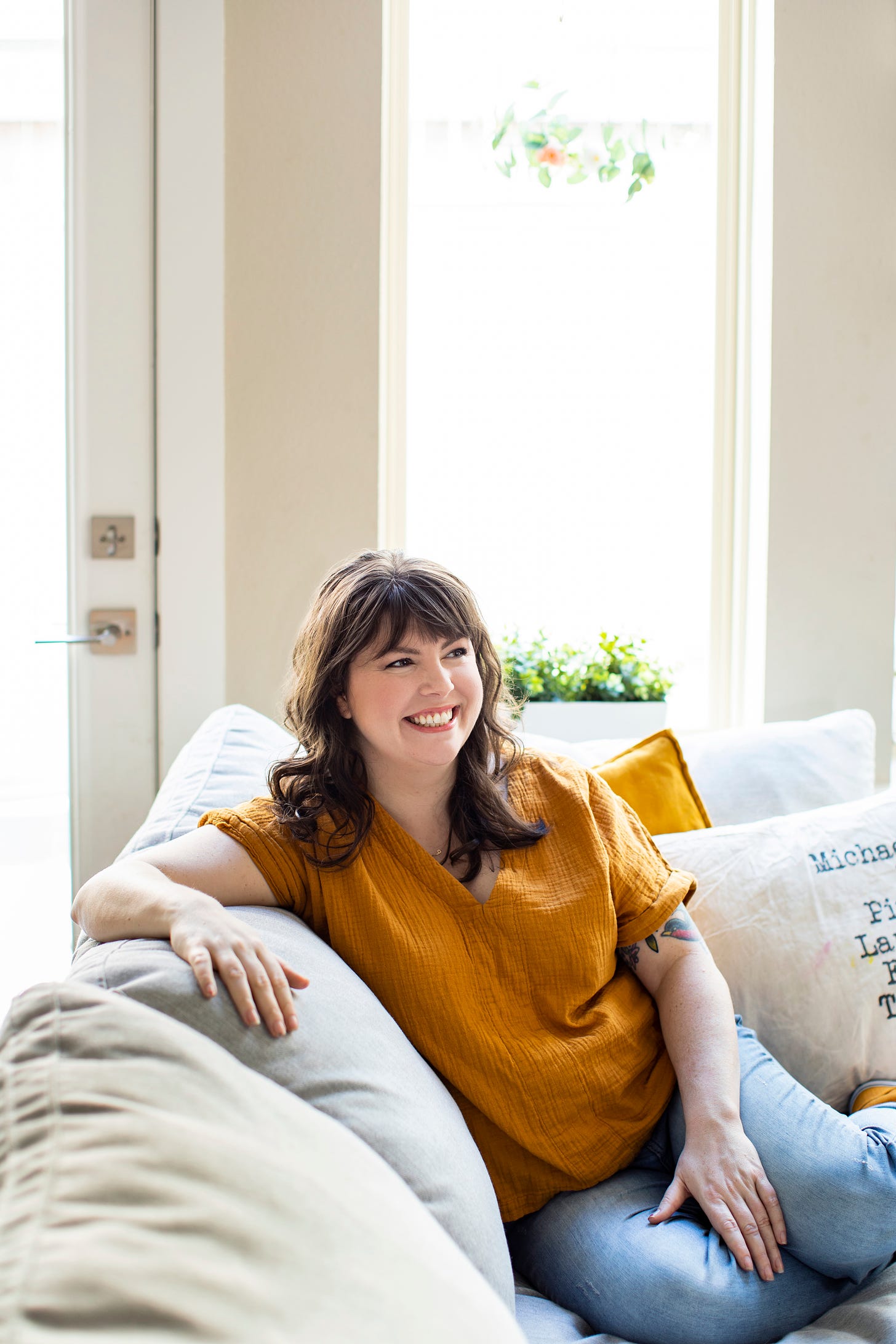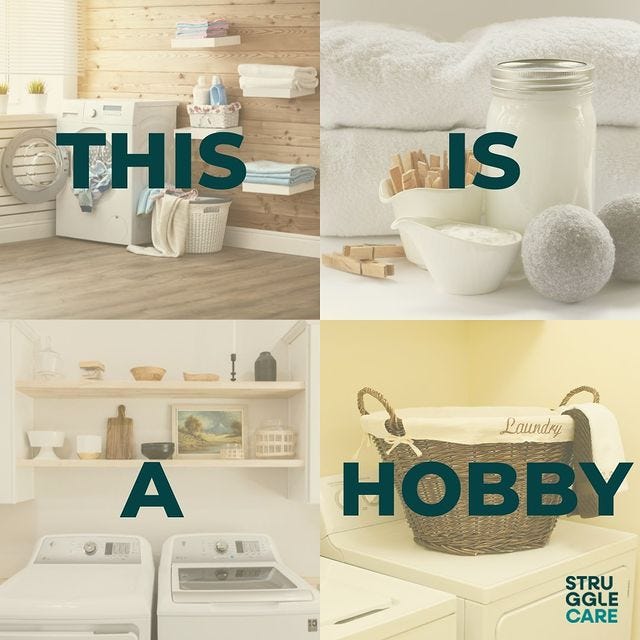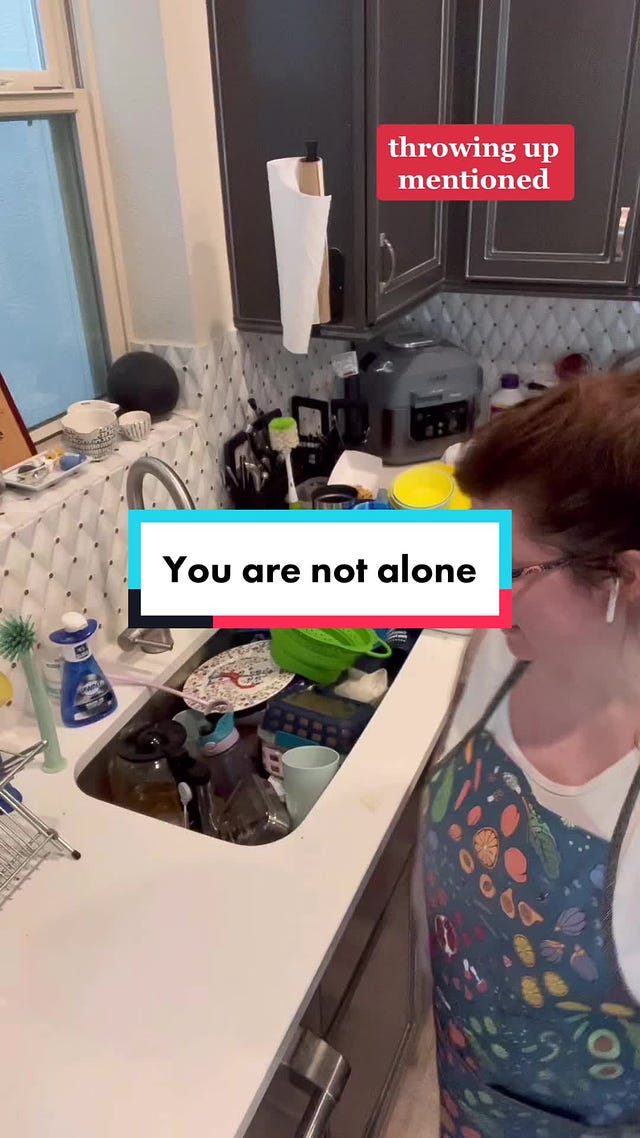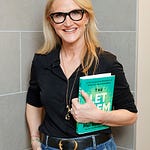We’ve done the same thing with housekeeping that we did with physical health: You are morally obligated to have this very clean, very organized, very aesthetically pleasing home, particularly if you are socialized as a woman. And if you do not do that, you deserve my shame and derision and criticism and all that stuff. So that’s when I started talking about this idea that care tasks are morally neutral.
You’re listening to Burnt Toast. This is the podcast where we talk about diet culture, fatphobia, parenting and health. I’m Virginia Sole-Smith I also write the Burnt Toast newsletter.
Today I am super excited to be chatting with KC Davis! KC is a licensed professional therapist, author, speaker and the person behind the mental health platform Struggle Care. She is domestic blisters on TikTok. And she is the author of How to Keep House While Drowning, a book that I read earlier this year and just cannot say enough good things about.
I started thinking about this conversation after I wrote an essay on organization as a hobby. KC is very, very good at helping us break down all of the assumptions we make about what our houses need to look like, about what care tasks need to look like, and at offering ways to reframe all of that so that your space actually serves you instead of measuring up to some unsustainable ideal, which you know, we are all about doing here. So here’s KC!
Episode 73 Transcript
KC
I started my TikTok channel, gosh, I guess we’re coming up on three years ago. I primarily use it to talk about how we can take care of ourselves when we’re in a hard spot. So for some people that’s a hard season of life. For other people that is a lifelong disability or maybe a bout with mental illness. Maybe it’s just being overwhelmed or being burnt out or any number of barriers that can make it difficult to care for ourselves.
I think that when we think about caring for ourselves, there are two main things out there mainstream and one is the “self care” movement, which in my experience can get very privileged. You know, a lot of bubble baths and pedicures and talking about things that require the privilege of extra time and money. And then when we talk about care tasks, like doing the laundry, and the dishes and things like that, if you want help with that, I often find that a lot of the resources out there are what I call like “boot camp” style motivation, where it’s like “Get up! Figure it out! Have some self respect!” like, “Do it!” And I don’t find those very motivating.
So my content is the cross-section between mental health and and care tasks, and how we can use self compassion and accessibility and accommodations to raise the quality of our life and make it a little bit easier to take care of ourselves.
Virginia
I first got obsessed with your work when my friend
of sent me a post you did about super pretty laundry rooms, and it says “this is a hobby.” It was such an epiphany for me, I have to tell you. I don’t know, I’d always sort of thought that pretty laundry room kind of content was supposed to be about organization. That it was supposed to be about making your life easier. And I had this sense of “Well, it’s intended to be helpful and if it’s making me feel bad, it’s just because I’m not doing doing it right.” And as I was making notes for our conversation and I wrote that down, I was like, “Oh, that’s diet culture. That’s perfectionism.”I would love for you to talk a little bit about how you came to realize that so much of what we’re told we should do or have to do in terms of domestic work is unrealistic and unsustainable and unhelpful?
KC
When people ask how I fell into talking about this philosophy, I can point to several things in my life that led to that moment. I could talk about my history with addiction, I can talk about my history as a therapist, I can talk about my history in high control groups. But one of the main things was probably two or three years prior to starting my TikTok channel, I got into the anti-diet movement and opened my eyes to this idea that we might say, “Oh, it’s about health, it’s about health, it’s about health,” but we’ve also moralized “being healthy” to mean if you’re not striving to be the best human specimen that ever existed, that’s a moral failing on your part. And because that’s a moral failing, you deserve derision and shame.
So I learned that from listening to anti-diet creators, from listening to fat liberation advocates, and it really sunk in and changed my relationship to food and my relationship to my body. And then fast forward two years, I found myself postpartum with a toddler, in a new city where I didn’t know anybody. My husband had just started a new job as a lawyer and the pandemic shutdown happened. We both were—all of us in the house—were just drowning in trying to keep up with the dishes and the laundry, and the cleaning, and the tidying and the bottles and the this and the that. And as I began to talk in my videos about like, “hey, here’s a way that I’m making cleaning a little bit easier,” so many people started to speak up and say this similar sentiment of “I love seeing your house because it looks like my house and I’ve always felt so much shame over it.”
And that’s how I kind of naturally pivoted into you know what, dishes are also morally neutral. We’ve done the same thing with housekeeping that we did with physical health, which to say, you are morally obligated to have this very clean, very organized, very aesthetically pleasing home, particularly if you are socialized as a woman. And if you do not do that, it is a moral failing of laziness and immaturity and irresponsibility, and therefore, you deserve my shame and derision and criticism and all that stuff. So that’s when I started talking about this idea that care tasks are morally neutral. They don’t make you a good or bad person, right? It’s not about whether you’re doing it perfectly, or whether you’re doing it aesthetically pleasing, or whether you’re doing it in a way that your father or sister in law likes, right? It’s about does your home function for you? And if it does, it doesn’t matter if it’s aesthetically pleasing. And if it doesn’t, then you deserve compassionate help and support to help get you to a functioning place.
Virginia
I’m thinking, too, as you’re saying this, how another way the house and health parallel each other is how much we have class signifiers bound up in both of them, right? The thin ideal is very much a white, upper class ideal. And the house you’re describing, this kind of Martha Stewart house—that’s what I grew up thinking of it as—is absolutely a white, upper middle class or wealthy ideal. The messy house, the house with dirty dishes in the sink, all of that signifies class, right? In a way that we don’t really like to talk about and that’s a really interesting piece of this.
KC
Yeah and I’ve gotten my fair share of critical hate comments online from people that think that messiness is a moral failing. But even so, I have noticed that I don’t receive half as much shame and derision as people who make similar videos whose homes are older or who are judged as not having as as much money as me.
My husband and I, this was our first house, but we also bought it as an inventory house, like it was just built. So the inside of our house is nice. And I think that that goes into a lot of the reason why there are people that go, “Oh, KC, that nice woman that helps people clean.” And I think it would be very different if I was a fat woman, if I was a Black woman, if I was a poor woman. Then I think those other systemic, oppressive sort of biases and prejudices would obscure anyone from actually learning because they’d have that all those judgments about, “Well, if you’re poor, then that’s a moral failing and I’m allowed to be judgmental.”
Virginia
Right. We are performing for each other when we’re trying to maintain the perfect home and when we’re trying to maintain the perfect body. This is health as cultural capital. This is a way of performing our value. But it’s making us complicit in this larger system that I think a lot of us don’t want to be complicit in. I don’t want my house to be reinforcing all these toxic ideals and oppressive systems. So if that means leaving dishes in the sink, like, sure. I can radicalize that way.
KC
Exactly. It’s always funny to me the the comments that I get that are like, “You’re so lazy, why don’t you just clean your house?” Those kinds of comments are always on videos of me cleaning my house. There’s almost that direct parallel to when people are harassing a fat woman at the gym. Where it’s like, what do you want?
Virginia
I’m literally doing what you said you wanted and you still want to shame me.
KC
That always just, to me, pulls that curtain back. It’s not actually about health. It’s not actually about your kids deserve A,B,C. Most people don’t give a shit about other people’s kids. And if you did, you’d be on board because a non-judgmental approach to finding ways to make your home more functional is absolutely the best thing for a parent who is struggling and not able to provide that for their child.
Virginia
One reason I think I’ve had a block on this for a long time is because I do have a lot of these privileges. I am a naturally tidy, organized person. This is something I’ve written about in my newsletter. It has certainly been a problematic thing in my life, but it also gives me comfort and security to have clear countertops. There’s a lot to unpack there.
But I think there’s probably a lot of us for whom this perfect house ideal just feels like just a little bit out of reach. And I think that’s another diet culture parallel, right? Often, the people who struggle the most to identify diet culture and anti-fat bias are naturally thin people for whom a “perfect” body feels very in reach. If they just commit to the gym workout, if they just cut out whatever food group, you know?
As opposed to those of us for whom the perfect body is just nowhere in our worldview. And so it makes more sense to say, “Well, I’m gonna reject this whole system.” I can see that whole system, because it doesn’t apply to me.
KC
Yeah, I definitely think there’s that aspect of, if you look at a system and realize I am disempowered in the system, I’m never gonna win, it’s easier to reject that system outright than it is for someone who’s like, “Oh, I’m being disempowered in the system but I’m so close to having power in the system.”
Virginia
It’s like, “One more trip to the container store!”
KC
“If I just lost 10 pounds,” right?
I think that there are a lot of people that read my book that come to my content, and their main issue they would say is “I have trouble starting.” So, “I feel overwhelmed. I feel like I don’t have the skills. I feel sensory overload at dealing with it. I’m struggling with motivation, with task initiation, and therefore everything’s kind of building up and becoming overwhelming.”
And then the flip side is I have just as many people that say, “I don’t have any problem starting. I’m a naturally tidy person. I actually have trouble stopping.”
Virginia
I’m raising my hand.
KC
“I have trouble sitting down and resting, if everything is not done or put perfectly in its place.”
And like you said, if it’s “Oh, but it’s almost perfect, so if I just put a little more effort.” And that would make sense, if you were creating a painting or a craft that had an end point. But care tasks are cyclical. They’re always moving. And so if you have the mindset that you’re not allowed to rest, you’re not allowed to recreate, you’re not allowed to blow something off until everything is done, you’re going to exhaust yourself. Because nothing’s ever done.
As soon as it was safe to do so, I hired a cleaning service to come in once a month, do a deep clean, help me out. And one of the interesting observations I had about myself is that the hours right after that cleaning are my most anxious hours, my most anal retentive hours, my most on guard, snapping at my family hours, because there’s this like, “Okay, it’s done. Let me just have it for a couple of hours.” And so it’s like, the first juice that spills I blow my top, right? And I think that that really represents that even in me, there’s this idea that we’re supposed to get everything to the done stage and just hold it there.
Virginia
Yes, yes! I have the exact same experience when my wonderful cleaning person comes and I dread my children coming home from school later that day because I just want it. I guess what I struggle with is: It also is calming to me, right? A clean house calms me down. I am someone who is stressed out by a lot of clutter. I grew up in houses that were pretty clutter-y and I think this is a response to that in some ways. So what of this is helpful? And what of this is me buying into this really unhelpful ideal?
And where do you find that line if you’re like, “This does meet a need of mine but it’s also part of this larger system I don’t want to be a part of and it’s making my life hard.” I mean, there have definitely been times when I’ve not wanted to have friends come over because I’m thinking I can’t get the house together in time. And then I’m shortchanging myself of that experience.
I don’t mean to make you do therapy on me, but…
KC
No, no, I love questions like this. I think it’s a perfect question. Because, I think that when we think of that question, we feel very either/or. So, is it wrong that I want to put everything in its place? Or is it valid that I could put everything in its place?
I think it’s more like, let’s try to bring in both sides. Let’s try to close the gap on either end. So on the one hand, there are some ways in which your childhood has created neural pathways between the experience of clutter and perhaps the experience of unsafety or chaos or feeling out of control or maybe feeling not cared for, or fill in the blank, I don’t know the situation enough to say what it might actually be.
And that association has less to do with the inherent clutter and more to do with the emotional context of that clutter. Now there are definitely hoarding level situations where it’s like, it doesn’t matter how happy the family is, this is non-functional and traumatizing. But a lot of people will say, “My house was really cluttered, but we were a chaotic, artistic, loving, close knit family that flew by the seat of our pants and my mom never cleaned a dish right in her life but she was at every soccer game,” right? And you hear this very different emotional context than someone who says, “My house was really cluttered. And sometimes it’s really severe, like my mom wouldn’t get out of bed. And my dad wouldn’t help around the house.” And so there’s this emotional context.
And I think unpacking that emotional context and diving into what that is, is helpful. I think that creating some affirmations for yourself in your own home about the functionality of your home is helpful. And, I don’t think this is one of those things where anybody should be saying just spiritualize your way out of it. You know what I mean? Let’s work on those things not because there is a moral obligation for you to heal these wounds, but because you’ll be happier in your space if you can unpack and roll through and process out some of those stressors. But also, let’s look at your physical environment and let’s see how that environment can serve you without making you serve it. So I don’t want you running around thinking “I can’t sit down, I’m really having a ton of stress. I can’t ever let my friends come over.” Because, that’s distressing for you.
Virginia
Totally.
KC
So we’re not looking at is it healthy or unhealthy because you have to be healthy. We’re looking at what’s your level of distress and where’s the distress coming from? And what things can we do to lower your distress? Some of those things will be the emotional work around it, but some of those things will be the physical accommodation. Maybe you’re someone who needs a lot of closed storage in your life, right?
Virginia
I am that person.
KC
If you decide you need more storage, you are not someone who should go out and get a bookshelf, you are someone who should go out and get an armoire, or something that closes because then you will be able to get your space into that sort of serene, Zen space quicker, without exhausting yourself and without having to be perfect, because it doesn’t have to be perfect on the inside of the cabinet.
And if you’re privileged enough to have the extra bedroom, maybe that’s just the Doom Room. Like, that’s the room that you let not be, you know... Or maybe there’s one part of your house that you go, “This is my spot.” This is my room, or this is my chair, or this is my corner, and it’s perfect, and it’s going to be perfect, and I will anal out on it all day long—that’s probably a very weird way to put that! But you will allow yourself to be anal retentive about it. And you’ll tell your spouse and your kids to kick rocks if they come near it. And you allow yourself to have that in that space.
So I think it’s both, right? Like I think, yeah, unpack it, great. One of the things that I’ve been thinking about—my husband actually just purchased a new home. And it’s a little bit bigger than the home we’re in now because our kids, when we moved into this home, I was pregnant and had a toddler and they had a playpen. And now they’re like running through the halls.
Virginia
And you realize how much space children take up. It’s a lot. Yes.
KC
So, interestingly enough, as I’m thinking about moving into this bigger house, my immediate thought was, before I do this, I have to declutter. I have to downsize my stuff. I have to have less stuff. And that seems counterintuitive to a lot of people, because they think, Well, no, you’re getting more space, you’ll finally have space. But for me, I understand that if I have so many things in a bigger space, it will be harder for me to feel like I can keep it functional. It will take much more time to keep it functional.
Virginia
That makes sense.
KC
And so that’s the way I’m thinking about it, because it is going to be more functional in a lot of ways for our kids to be able to run around, for us to be able to have my mother-in-law come without making her sleep in a kids room. And at the same time, this is also going to present some challenges for me, because I’m not a naturally tidy person.
Virginia
It’s more to keep up with.
KC
Yeah, it’s way more to keep up with and so how can I get ahead of that? And one of those ways would be not having as much stuff.
Virginia
We actually did something similar when we moved from our first smaller home to a bigger home. We hired a dumpster before we left that smaller home and our new house has a really big, like the entire footprint of the house is an unfinished basement. So there is this place where I can always dump when I need to just get the clutter out of the way. I can only just throw it down to the basement.
But then the basement starts to stress me out a little bit because it gets out of control and I just realize like having this big place to dump everything is not going to solve the problem if there’s too much stuff.
KC
And maybe, if it was a smaller area, it would be more functional because you would still have a place to go okay, I’m just gonna put it over here. But if a smaller area gets kind of stuffed and full and you go oh, it’s time to clear this out. You know, looking at a closet and going time to clear this out is a lot less overwhelming than looking at a huge basement the entire footprint of your house.
Virginia
Yeah, we can tackle it in stages at a time but it’s it’s painting the Brooklyn Bridge or whatever. We get one corner cleaned out, we finally get to the end, and that first corner is a disaster again and we just keep rotating and it’s like, why?
KC
But here’s the thing I would also say: There’s nothing wrong with that. I’m not saying to not change it if you want to change it, but sometimes the distress we feel about our house isn’t about that’s not functional for me. It’s about “it shouldn’t be this way.”
Virginia
Yes.
KC
Right. So you’re wanting this basement to be done. Well, but if, like, if that works for you, though—working in that little circle, where you’re always creating a little more space when you need it—that might be a care cycle that is functioning just fine. And maybe it’s not, but I’m just saying like, it actually is fine. If you’re actually getting rid of things, if you’re organizing at a quick enough rate to free yourself up space to be able to dump something there when you feel overwhelmed. That is a system that could work fine for you. Does that make sense?
Virginia
Your making me realize there’s no gold star for an organized basement. Like, when am I expecting to get the prize for that?
KC
Like maybe that’s the function of your basement. It’s that workspace to process through your stuff in a place where at the end of the day, you can still shut the door and sit on your couch and enjoy a space that is clean and tidy and put together.
Virginia
Well you’ve just solved a huge issue in my life, so that’s amazing. We say all the time—we bought our house in 2016, and had we known the pandemic was coming. Like, one thing we did really right was we bought a house that had office space above the garage because we both work from home and we knew we needed that space.
But one thing we did really wrong was we bought a house with an open concept downstairs. And during the pandemic I was like, “I can never escape them. I can never escape the children. I can never escape the mess.” If I’m in the kitchen, I can see all the way to the other end of the house. There was no way to close the door on any messes.
I mean, we’re never moving, we love our house. But one thing we did was part of the unfinished basement is now a kids’ playroom area, even though it’s an unfinished basement, just because I was like, some of this stuff cannot be in the main living space, for my peace of mind. And I just want to underscore the privilege that I’m talking about, a large house with a basement. I realized not everyone has this much space to work with. It’s just interesting realizing how much picking the house initially was on some level buying into a larger aesthetic standard, right? These beautiful, open concept houses were very trendy. And I think that started to shift in a lot of ways because of the pandemic and how we actually live in our space.
KC
And I do think it brings up a concept that’s applicable to anyone, which is that rooms don’t have rules. We actually have, because of the layout of our house, what they did was they took the floor plan and they put it on these like zero lot line, almost like townhomes. So there’s three stories, but each story is actually kind of small, right? So we have good square footage, but the way that it’s kind of chopped up and put on top of each other means that if me and my husband and both of our kids are downstairs in the living area, we kind of feel like we’re on top of each other. Especially a two and four year old that are running around like crazy, spreading their toys everywhere. And one of the things that we did right when we moved in was, the corner that was supposed to be the dining room? We just didn’t put a dining room in. Like, we don’t own a dining room table. We turned that into a play corner so that we could still see our kids while we were cooking dinner. Our kids had a place to go where we knew where they were. That’s an example of okay, it’s not some separate place, but do you need a dining room table? My husband and I eat in front of the TV. The dining room table would just collect stuff.
Virginia
For the like two times a year you would want to host a big dinner or whatever.
KC
Exactly! Versus the every single day, my kids need a functional space to play. And the other idea is if you have a space where you don’t have any extra bedrooms, but maybe you have two kids and they each have a bedroom, some people they have found wait, if my kids are just sleeping in their bedrooms, and they’re not opposed to the idea of sharing a room, maybe my kids would rather have a shared living space that is only a bed and a dresser, no toys in there. In fact, almost nothing in there to even make it messy. So it’s not an extra room to clean. That’s just where we go to sleep at night. And then the other bedroom is a play space or is a gross motor movement space.
Virginia
I tried to sell my kids on that. They’re four years apart and the age difference is just big enough that it doesn’t work. They were really into it when they were three and seven. We tried doing some sleepovers for a while to test out the idea and then the older one was like, “Yeah, no. I don’t actually want her in my room.” So that idea is on the back burner for now. But I do think it’s a great concept, especially if you have kids close in age.
KC
Same with closets.
Virginia
Your family closet is genius. Genius!
KC
All of my family have their clothes in one closet. And some of that’s the layout, my my primary walk-in closet opens to the laundry room. So it’s really convenient to take laundry out, take three steps, put all of it away. And my kids still need assistance dressing, so this makes sense for us in this period of time. And what happened when we moved to a family closet was all of a sudden, we had two whole closets that were completely empty now.
Virginia
Oh, that’s amazing.
KC
So then we could think about well, now I could use these closets for something else.
Virginia
Oh, that’s really, really smart. If it’s close to the laundry, why would you ever want the clothes to be anywhere else in your house? So smart.
KC
My downstairs coat closet was stuffed to the brim with coats we never wore. And what I realized one day is that it’s not that I want to get rid of this stuff, but this is not stuff I’m accessing every day and this little coat closet is one of the only downstairs storage spaces that I have. So I really need to use it for the things that I needed access to every day because there’s nowhere to put those things. And the other part of that is like I live in Houston, Texas.
Virginia
Heavy coats are not a thing.
KC
Right. Like we don’t need coats. We need maybe a sweater and a coat two months out of the year. So I try never to say, “Here’s what everyone should do.” But instead, talk about having the creativity to think about who you are in the context of your home and your own needs and your own functioning and going okay, maybe a person who only has one downstairs closet in Houston, Texas doesn’t need to be keeping it shoved full of winter coats all year long. It was totally sufficient to put hooks on the back of that door, hang all of our one little coat that we need, and then put shelving in it. And now I finally have downstairs storage to put things away so that they aren’t sitting out.
Virginia
I want to talk a bit more about the appearances piece of this because again, that’s the piece where I’ve realized I have the work to do. And that’s also where it intersects so much with diet culture.
Is it worth challenging ourselves if the aesthetic piece has felt really important? Do I leave the dirty laundry out the next time friends come over for dinner? Like do you sort of challenge yourself to break some of those roles and see that you can survive it? Or is there another more helpful way to think about this?
KC
I certainly don’t think there’s anything wrong with that if you want to do some exposure therapy, but I don’t think you have to. I think what’s interesting to me is that when people will say, you know, I don’t want to sit down because having a perfectly clean house is relaxing to me. AndI’ve always thought that that was interesting. Because I mean yeah, I also find a perfectly clean house relaxing, but like—the beach is relaxing. I experienced the beach as relaxing, but I don’t experience not being at the beach as being anxiety producing.
Virginia
That’s a helpful distinction.
KC
Obviously, when I walk into a showroom or for that one hour when everything’s perfectly this place, or when I look at magazines of homes, like I feel that visceral response of “Oh, wow, how beautiful.” And I think that’s okay to feel that. I think though, if that is one of your only tools for coping with anxiety or one of your only tools for release, or if you’re trying to make that one particular tool carry more weight in your life than it’s capable of carrying, then I would just say that you’re somebody that deserves to have more coping skills than having to clean.
I actually do love a well put together, aesthetically pleasing, almost minimalist looking space. But I also have two kids. And I think for me the freedom comes in going, “Yes, it’s relaxing to have something aesthetically pleasing, but that’s not a value of mine that ranks higher than being able to function in my space.”
It’s not a value of mine that ranks higher than being able to spend time with my kids. It’s not a value of mine that ranks higher than being able to spend every single night on the couch with my husband watching some silly show that we like.
It’s the freedom to say, it’s okay to value these things, but if you find yourself feeling morally obligated to value them over other things in your life, or to the detriment of your own health and wellbeing, you deserve to rearrange some things, right?
Virginia
Yeah, and to value rest just as much.
KC
And to value other things! Like, it’s wonderful to have a beautiful home. And I like to have a beautiful home, my home does not always look beautiful. And maybe one day, I will have a different season of life where I have more time and energy to put into that particular hobby or stress release activity, but I can’t afford to put that at the top of my list right now because other more important things in my life would suffer.
Virginia
Like, when I’m having that anxiety of “oh, we can’t have people over the house as a mess,” I need to say, wait, but actually, time with our friends is a value of mine. I want that. I love when we have friends over and our kids get to play with their kids. That’s something that I want to cultivate us doing more often.
So, if that means letting the house go so we can do it, that’s better than the alternative of making myself stressed out about the house in ways that make the whole experience so tense and weird for everybody.
KC
And I think there are some parallels to diet culture there. Like I have some some health stuff going. I found out recently that I have fatty liver. And there were a couple of things in my labs that were like, almost like a high normal, if that makes sense. And I met with a dietitian, and I was like, “Listen, I need to make some changes so that I can address some of these things”. And I almost feel my body go into like fight or flight when I talk about making food changes just because of all of the unpacking that takes.
But I purposely met with a dietitian who is also a licensed clinical counselor. And at one point in going through that, she said, “I want you to also recognize you do not have to make any of these changes right now. This doesn’t have to be a priority right now. Nothing that you’re looking at or dealing with is something that if you don’t do it this year, you’re going to have some major health consequence.”
Virginia
That’s so freeing.
KC
Would it be great for you to prioritize eating this over that because of the effect that it might have on your cholesterol or your fatty liver? Sure. But also, you’re allowed to look at the other things going on in your life this year and make the call on whether you’re capable of integrating that change into your life while still maintaining your quality of life.
Because if you’re also dealing with your postpartum depression, transitioning your children into a new school, writing a book, dealing with your mental health, you are not morally obligated to put this on the list. And I think that that is a very similar parallel.
Virginia
I just wrote a piece for the newsletter about seasonal exercise and how we have such an all or nothing mindset about exercise that comes entirely from diet culture. It’s entirely bound up in equating exercise with weight management when the reality is for so many of us, there are weeks, months, years where exercise cannot and should not be the priority. We need to give ourselves permission to move through periods where it fits and periods where it doesn’t fit, and odds are you’ll exercise more consistently in the long term if you give yourself that permission, than if you think of that as something you have to do perfectly or not at all.
Butter
KC
Okay, so I recently—I don’t know if this is part of my ADHD or what—but I get really fixated on like, one certain meal and just eat it over and over and over. And recently, I got fixated on tuna poke bowls. And then my bank account was screaming at me about it. So then I tried to making them at home. And I realized that my grocery store sells frozen ahi tuna filets. So I started buying those and I started making that home. I just sear it two minutes on both sides, add it to some rice and avocado, put some ponzu and soy sauce on it. And to me, that’s heaven. But, you have to thaw it for like 24 hours. And that’s a big deal for me to tell you what I want to eat in 24 hours. So there were several times where I would do that, and then it would come time to make myself dinner, and I would be really exhausted. My kids have been really sick lately. We’ve got some other stuff going on. And I would just be like, “I don’t have it in me to spend the 15 minutes cooking rice that I need to.” And so then I would end up having to throw the tuna fillet away—
Virginia
Oh that hurts.
KC
Yeah, it hurts. But it’s one of those things where it’s like, I probably shouldn’t. It’s like, it’s raw tuna…
Virginia
Oh yeah, you can’t roll the dice. But it’s just like, you spent money on it. It hurts a little to have to throw it out.
KC
I didn’t want to keep doing that, right? I didn’t want to keep wasting it. And then I was at the grocery store the other day—and I often buy those Uncle Ben’s microwaveable rice packs for dirty rice or Spanish rice or whatever—and then I saw that they had just plain white rice. And I just had this like gentle moment with myself where I was like, “KC just get a few.” Just get a few for those moments, those those nights when this was the meal that you planned, but all of a sudden you don’t have it in you to cook the rice. You know, get the pot out, put the water out, or whatever. And I did that for myself. And it was just such a kind of moment of self care because within the week, I had that exact thing happen. And it was like okay, thank God I only have to put a bag into the microwave for 90 seconds.
Virginia
I love short cut anything that makes getting dinner easier. I’ve recently gotten super into salad kits for the same reason. I was like wait, the dressing comes in a little packet in the bag? Where has this been my whole life? All I have to do is open packets and dump things? It’s so great.
Well, my butter actually ties into what we were talking about before, in terms of needing to create a space for yourself in your house that’s your own. So I am very privileged, I have this lovely home office above our garage. I have been a work from home person since the early 2000s. And I learned early on that for my mental health, I needed to not have my work where I slept. I couldn’t combine the two. Which was challenging when we lived in studio apartments in New York City, but anyway. But now that I am a parent and a work from home person, I need separation from my kids even more. So I now have a secret iPad in my office. My kids don’t know about this iPad. Well, they’ve seen it, but they don’t care. It’s not their iPad. I bought one of the refurbished, many-generations-past iPads just so it can stream things. It’s got my Netflix on it. And I have a little corner up here with my secret iPad and my jigsaw puzzles, and I come up here for like an hour. And I love it.
KC
I love a puzzle. Can I just tell you that one of the things I’m excited about about our new house, is that I am gonna do something similar? Like, have a home office. And I’m gonna have a puzzle. I love a puzzle, and I haven’t really been able to do them since I had kids.
Virginia
They’re not toddler compatible.
KC
Not only do I have kids, but I have two cats. And I just didn’t have the time and there wasn’t a safe surface that I could do it on. So I’m gonna butter my toast with that soon.
Virginia
I really recommend it if you can fit a puzzle corner into your home office, because I was doing them down in our living room. But then the clutter of the puzzle would trigger my clutter stuff. I mean, obviously, there’s more I can unpack there, where I didn’t want the puzzle left out, but I don’t mind having it out in my office because then when I’m trying to l think through something I’m writing, I’m like, “Let me go do the puzzle for a few minutes.” And it gives my brain a break.
KC, thank you so much. This was fantastic. Tell listeners where they can follow you and how we can support your work?
KC
I’m on TikTok, that’s kind of my main channel. I do have an Instagram, @struggle care. My website is strugglecare.com. And from there, you can kind of get to everything that I do. You can buy my book, you can listen to the podcast. My podcast is called Sstruggle Care. You can download some free things. You can purchase some downloads. You can read some free resources. You can watch my TEDx talk, like you can do everything from my website, so feel free to head over there.
Virginia
Amazing. Thank you so much for being here!
KC
Thank you.
The Burnt Toast Podcast is produced and hosted by me, Virginia Sole-Smith. You can follow me on Instagram or Twitter.
Burnt Toast transcripts and essays are edited and formatted by Corinne Fay, who runs @SellTradePlus, an Instagram account where you can buy and sell plus size clothing.
The Burnt Toast logo is by Deanna Lowe.
Our theme music is by Jeff Bailey and Chris Maxwell.
Tommy Harron is our audio engineer.
Thanks for listening and for supporting independent anti diet journalism.



















Share this post